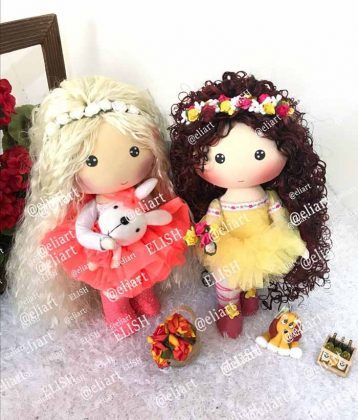Kayhan Life discovered Elish, an Iranian art doll studio, through its Twitter account @eliart. The workshop produces small handmade rag and soft dolls which closely resemble the Russian Tilda. The products are sold through the workshop’s Instagram and Twitter accounts.
We spoke to the founder and the principal designer of Elish, who, along with a friend, started their home-based business three years ago. She asked to be referred to as Elish, the abbreviation of her first and last name combined.
“A friend of mine and I are Elish’s principal designers, but we have a small team of artists who make various parts for the dolls,” she said.
Elish is 40 years old, holds a university degree in English, and worked as a translator until a few years ago.
“I made very little money working as a translator. Nowadays, selling dolls online is my sole source of income,” Elish explained. “I’ve loved sewing since I was a child. I used to sneak into my mother’s room and use her sewing machine to make dresses for my dolls. I saw a picture of a Russian doll three years ago and immediately fell in love with it. I’m self-taught. I’ve learned the craft through trial and error.”
“Some doll makers copy my designs without my permission. That is unethical,” Elish noted. “I’ve also encountered a few problems when I’ve followed others on Twitter to promote my dolls. A few people have criticized me for not dressing my dolls in line with the strict hijab law.”
“My small business has been affected by the current state of the economy. Prices of raw materials including fabric and synthetic hair have increased considerably. Some items are tough to find. The rial has fallen sharply against the dollar. Authorities have also restricted Telegram channels, making it difficult for me to market my products. A rag doll sells for $60 in foreign countries, but we ask only $21. Many people still complain about the price.”
Elish added: “Our dolls are very popular with Iranians living in other countries. However, it is currently next to impossible to do business with the outside world. Iranians living abroad have a greater appreciation of our dolls than those in the country. Many of them place orders for our dolls through their contacts inside Iran. Most retailers I showed our dolls to yesterday didn’t buy any, and others paid much less than the asking price. It is discouraging.”
Elish added: “Some people have suggested that to increase sales we should promote our dolls as having been made in China or other foreign countries. However, I don’t want to put another person’s name on my product. Foreign-made dolls have admittedly inspired my work, but I design all the clothing and other details. The dolls are my creation.”
Translated from Persian by Fardine Hamidi




